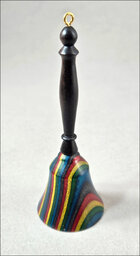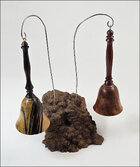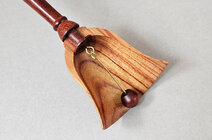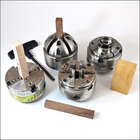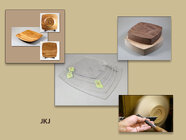I was finally able to reschedule some commitments which free up time for me to join my local AAW affiliate club. It meets the second Saturday of the month and is about a 40 minute drive, so not bad. I’ve been to three meetings and this was actually the first time I’ve seen someone turn in person. They bring in someone to do a demo that’s free to attend and afterwards have a class where you get to turn the item for a small charge.
I haven’t stayed for a class since usually once I see something in person I can duplicate it. One item was a turned and carved spiral finial and the other was a pepper mills.
I have taken bowls and hollow forms in to two meetings for their gallery and they were well received. It was strange to me that I received a lot of questions on how I turned certain things and several about my finish process. I say that because during the first meeting I introduced myself to the group and told them I had never been around other turners so I would be asking a lot of questions .
.
I was approached during the last meeting by the chapter president who said several people had asked if he could get me to do a demo and teach a class. So long story short I have agreed and currently scheduled for the first slot available, May 2026.
We also agreed that the heart bowl would be a good start, so I back to turning heart bowls next year! I don’t have any problem doing the demo or teaching the class as I’ve had several people come watch me turn that wanted to learn how.
The big question is he wanted to know what I would charge and explained how they usually pay as their max capacity for a class is 12 people. I told him it really was up to the club and I would not charge much but I would like a little something for my time.
So for you who demo and teach, what is a good rate to charge? I’m considering doing it for free and just donating the fee back to the club. Any pointers you can share on doing a demo and class?
Also, there is some guy named @Michael Anderson doing a demo and class in January, anyone know who this guy is .
.
I haven’t stayed for a class since usually once I see something in person I can duplicate it. One item was a turned and carved spiral finial and the other was a pepper mills.
I have taken bowls and hollow forms in to two meetings for their gallery and they were well received. It was strange to me that I received a lot of questions on how I turned certain things and several about my finish process. I say that because during the first meeting I introduced myself to the group and told them I had never been around other turners so I would be asking a lot of questions
I was approached during the last meeting by the chapter president who said several people had asked if he could get me to do a demo and teach a class. So long story short I have agreed and currently scheduled for the first slot available, May 2026.
We also agreed that the heart bowl would be a good start, so I back to turning heart bowls next year! I don’t have any problem doing the demo or teaching the class as I’ve had several people come watch me turn that wanted to learn how.
The big question is he wanted to know what I would charge and explained how they usually pay as their max capacity for a class is 12 people. I told him it really was up to the club and I would not charge much but I would like a little something for my time.
So for you who demo and teach, what is a good rate to charge? I’m considering doing it for free and just donating the fee back to the club. Any pointers you can share on doing a demo and class?
Also, there is some guy named @Michael Anderson doing a demo and class in January, anyone know who this guy is
Last edited:

